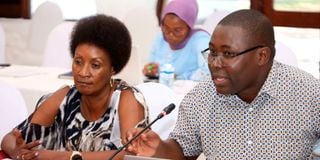Premium
TSC rejects proposals on education reforms

Teachers Service Commission boss Nancy Macharia (left) and the agency’s Legal Director Cavin Anyuor (right) address members of the National Assembly Departmental Committee on Education proposed reforms, outlined in the report of the Presidential Working Party on Education Reforms during a public hearing at the Sun and Sand Hotel in Kilifi County on September 21, 2023.
The Teachers Service Commission (TSC) has rejected some recommendations made by the Presidential Working Party on Education Reforms (PWPER), saying, its proposals were not considered.
Addressing members of the National Assembly Departmental Committee on Education during public hearings in Kilifi County on Thursday (September 21), TSC boss Nancy Macharia said their views to the task force that is chaired by Prof Raphael Munavu were neither considered nor acknowledged in the final report.
Ms Macharia said the PWPER report, which will be implemented once it is ratified by the National Assembly, puts them at odds with the Ministry of Education and the Constitution and interferes with their mandate.
The teacher's employer cited the recommendation that TSC officials should seek permission from the Ministry of Education (MoE) before going to schools.
The task force recommended that the MoE be mandated to develop guidelines on how all teachers who graduated before 2023 will undergo a mandatory one-year retooling and upgrading programme to comply with the curriculum change.
But Ms Macharia said the responsibility to develop the guidelines and enforce the recommendation that only teachers who have undergone the mandatory retooling should be allowed to teach in all basic education institutions had been wrongly given to the MoE without reference to the ongoing retooling by the TSC.
She said the recommendation has the effect of restricting employment opportunities for teachers and altering the registration requirements set out in the Teachers' Code.
The TSC intends to continue spearheading the retraining of in-service teachers. According to TSC, it has so far retrained 229,292 in primary school, 55,125 in secondary and 49,540 in junior secondary school.
“The in-service teachers are already employed and managed by TSC. All post-teacher training and capacity-building initiatives will be coordinated by the Commission in accordance with the Employment Act. The commission cannot discriminate against teachers who have not upgraded for compliance during registration and employment,” she said, adding that TSC would ensure compliance with the registration requirements in the Teachers’ Code. The task force also wants the MoE to review the entry grades for pre-service teaching programmes.
But the TSC said giving the MoE and any other body the responsibility of setting entry standards for teacher training amounted to usurping the commission's constitutional mandate.
According to the teachers' employer, the recommended entry grades are not harmonised with the existing registration requirements under the TSC framework.
“The subject cluster approach will cease to exist. The 2023 cohort of DPTE students who will be admitted with an average grade of C (Plain) without consideration of numeracy and literacy will affect the current registration requirements,” she said.
Ms Macharia said the existing qualification framework and entry requirements should be aligned with the competency-based curriculum.
On the proposal to establish a comprehensive school system where all levels of learning are managed as one institution (PP1 to Grade Nine), Ms Macharia said the extension of TSc’s mandate to include the management of pre-primary education is a matter for county governments under Part 2 (9) of the Fourth Schedule of the Constitution.
She said the move will further increase the number of institutional administrators.
“The proposal is acceptable given TSC's institutional capacity, but requires a county government to specifically request to transfer the management of its pre-primary teachers to TSC,” MS Macharia said.
TSC also urged the National Assembly to develop a legal framework for the establishment of comprehensive schools, as pre-primary education is a county government mandate.
The legal framework will provide for either a transfer of functions from devolved units to the national government or constitutional amendments. The TSC has the institutional capacity to manage the pre-primary level.





